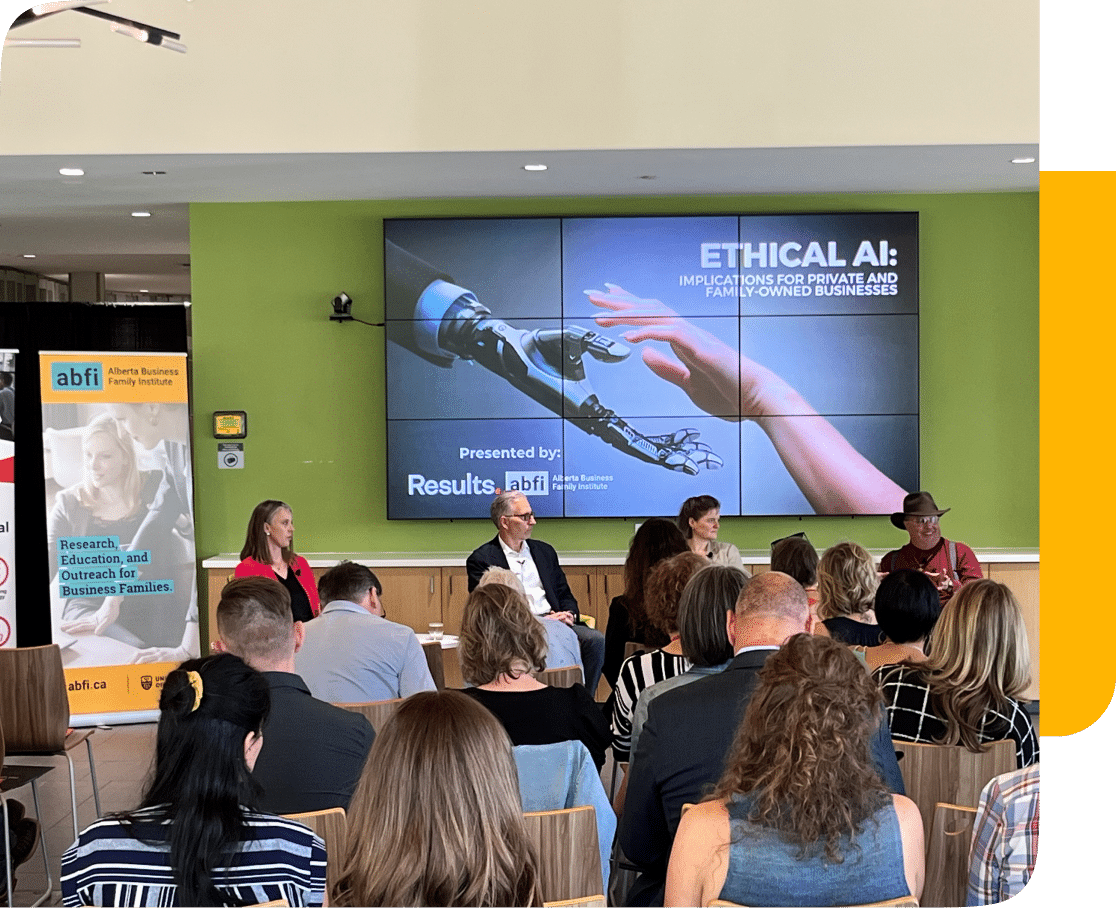News

Join us for a compelling episode of ABFI Table Talk featuring George Cantalini, President, CEO and Owner of Cantiro, formerly known as the Beaverbrook Group of Companies. In this episode, George shares his remarkable journey from a CA who “wasn’t really cut out for accounting” to leading one of Western Canada’s most innovative real estate enterprises.
Discover how George transformed a struggling land development company he purchased for $1 in 1995 into a diversified organization with over 150 employees and revenues exceeding a quarter billion dollars. Learn how his early partnership with mentor Tony Cairo shaped not only the company’s name (Cantiro combines Cantalini-Cairo) but started the foundation for multi-generational collaboration and mentorship that continues today with Tony’s son Ben.
Whether you’re interested in leadership transitions, innovative business models, or building customer-centric organizations, this episode offers valuable insights about evolving from a single-service company to an integrated family enterprise. George shares candid reflections about employee ownership programs, maintaining an innovation mindset, and preparing the next generation for leadership – including how his children’s different career paths are shaping succession planning.
The conversation explores Cantiro’s pioneering projects, from transforming Edmonton’s southwest with the Windermere development to introducing mass timber construction while taking on the West Block. George’s philosophy of “be Apple, not Blackberry” demonstrates how traditional real estate development can embrace innovation while maintaining strong community connections.
Tune in to ABFI Table Talk for an authentic discussion about business growth, mentorship, and creating opportunities for others to build their futures alongside yours.
Join us for an insightful episode of ABFI Table Talk featuring Bill and Steven Knight, the father-son duo behind Mosaic Home Services. They share their remarkable journey from running a successful demolition company to building a multi-brand home services franchise operation spanning from Halifax to Vancouver.
In this episode, discover how Bill built B&B Demolition from a $7,000 loan into Edmonton’s dominant demolition company, and how an unexpected exit eventually led to a new chapter with his son Steven. Learn how Steven’s decision not to take over the family demolition business sparked an innovative approach to home services, growing from a one screen repair company to a thriving enterprise with seven different service verticals and over 100 team members.
The Knights candidly discuss their complementary leadership styles – Bill as the “bull in a china shop” and Steven as the thoughtful strategist – and how they’ve leveraged these differences to build a culture of innovation and accountability. They share valuable insights about maintaining family bonds while growing a business, including their “stay in your lane” philosophy and creating work-free spaces for family connection.
Whether you’re interested in family business transitions, franchise development, or building customer-centric organizations, this episode offers practical wisdom about evolving from a single-service company to a scalable enterprise. Learn how listening to customer feedback drove their expansion into new services and how their unique approach to company culture – including letting team members create their own job titles – has built employee loyalty.
Tune in to ABFI Table Talk for an authentic conversation about family business resilience, leadership evolution, and creating opportunities for others to build their entrepreneurial dreams.
Join us for an inspiring episode of ABFI Table Talk as we sit down with Teresa Spinelli of the Italian Centre Shop. In Episode 8, Teresa shares her remarkable journey of unexpectedly taking over the family business after losing her brother and father and her journey of transforming a single store founded in 1959 into a thriving community enterprise with five locations and 672 employees across Alberta.
In this episode, discover how Teresa navigated the challenging transition from being “the little girl who played cashier” to becoming a respected business leader. She delves into the importance of building authentic community connections, fostering a family-first culture, and maintaining the warmth of a neighbourhood hub while scaling across multiple locations and cities. Teresa shares candid insights about balancing motherhood with business leadership and how her husband has supported the business and became a stay-at-home dad to support her family business.
Whether you’re interested in family business dynamics, community-based retail, or leadership transitions, this episode offers valuable lessons on leading with heart while driving growth. Learn from Teresa’s experiences on building an inclusive workplace culture, managing succession planning, and staying true to core values while embracing innovation.
Tune in to ABFI Table Talk for a compelling blend of business wisdom and personal reflection, as Teresa shares how she transformed from reluctantly joining the family business to passionately leading an organization that’s not just about “selling salami” but about creating community through food, culture, and genuine human connection.
How are leading family businesses navigating the artificial intelligence revolution while preserving their core values? A recent IMD AI Maturity Index reveals a striking reality: while family enterprises have historically led innovation, only 17 of the top 200 companies in AI adoption are family-owned or controlled. These pioneering family businesses offer valuable lessons on successfully balancing tradition with technological transformation.
The Family Business AI Adoption Gap
For many business families, the journey toward AI adoption presents a unique challenge. While companies like Samsung Electronics (ranked 10th globally) and Walmart (24th) demonstrate that family businesses can compete at the highest levels of innovation, many family enterprises are still finding their path forward.
“Family businesses often prioritize steady, sustainable growth over aggressive technological investment,” explains Matt Knight, Executive Director of the Alberta Business Family Institute at the University of Alberta. “While this approach has served them well historically, we must question whether this will continue to hold in the AI era.”
Understanding the Barriers to Innovation
Three key factors emerge from the research that help explain why many family businesses lag in AI adoption:
- Resource Allocation Dynamics
- Governance Structures
- Family Values & Cultural Considerations
- Start with Strategy, Not Technology
- Create the Right Structure
- Maintain Family Business Advantages
Join us for a compelling episode of ABFI Table Talk as Matt Knight hosts a deep-dive discussion with three experts in family business succession and wealth transition: Tom Deans, best-selling author of “Every Family’s Business,” “Willing Wisdom,” and “The Happy Inheritor”; Jane Halford, president of Halford Consulting specializing in governance and leadership transitions; and Bob Hahn, partner at HLH Chartered Professional Accountants with extensive experience in accounting, tax planning, and wealth management for family enterprises.
In Episode 7, our guests explore the critical conversations families need to ensure successful wealth and business ownership transitions across generations. Discover why Tom Deans advocates for selling family businesses to third parties and the transformative power of facilitated family meetings. Jane Halford and Bob Hahn delve into the challenges of engaging family members in succession planning, emphasizing the crucial role of trusted advisors in guiding sensitive discussions. They highlight the importance of initiating conversations, involving all generations and addressing financial and emotional dimensions to prevent conflicts and sustain the family business legacy.
Whether you’re a family business owner, a successor in waiting, or an advisor in the field, this episode offers invaluable insights into the dynamics of family enterprises. Learn about effective succession planning strategies, the significance of open communication, and how to balance personal relationships with business objectives. Our guests share real-world experiences and practical advice on overcoming common obstacles in wealth transfer and leadership transition.
Tune in to ABFI Table Talk for an enlightening and actionable conversation that blends professional expertise with heartfelt stories. Gain the knowledge and tools to navigate the complexities of managing and transitioning a family business, ensuring its prosperity for generations to come.
Join us for an inspiring episode of Table Talk as we sit down with Rohit Gupta, President and CEO of the Rohit Group. In Episode 6, Rohit shares his remarkable journey of stepping into the family business in 2002 and leading it to new heights. From beginning with 16 employees to a diversified enterprise of 260 team members, the Rohit Group has made significant strides in land development, new home building, retail, and healthcare across Alberta, Saskatchewan, and Ontario.
In this episode, discover how Rohit navigated strategic shifts—including exiting the hospitality and industrial sectors—to focus on areas that align with the company’s “DNA of capital.” He delves into the importance of governance through an advisory board, the challenges of succession planning, and balancing growth while staying true to core values. Rohit also shares insights on family business dynamics, the critical role of philanthropy, and how influential works like the Bhagavad Gita have shaped his leadership philosophy.
Whether you’re intrigued by entrepreneurship, family business dynamics, or the strategic aspects of business growth and governance, this episode offers valuable lessons on leading a family enterprise in today’s evolving market. Learn from Rohit’s hard-earned experiences on leadership, the importance of understanding capital structures, and the power of blending traditional values with innovative strategies.
Tune in to ABFI Table Talk for a compelling blend of professional wisdom, personal reflections, and the heartfelt story of a leader steering his family business toward a promising future.
Learn more about ABFI at https://abfi.ca/, connect with Matt Knight at matt.knight@ualberta.ca or LinkedIn https://www.linkedin.com/in/mattknight/ or Twitter @mattaknight
Learn more about Rohit Group at: https://rohitgroup.com/
This series is proudly produced by the team at Road 55 – located in Edmonton, Alberta. For more information, please visit: www.road55.ca






